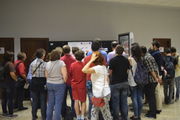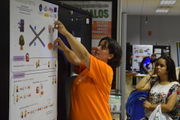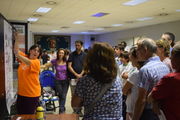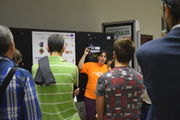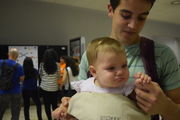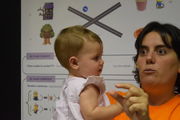The HOM effect at the Noches de los Investigadores (2015)
m |
m |
||
| Line 5: | Line 5: | ||
She used [https://en.wikipedia.org/wiki/Minions_(film) Minions] [[File:lw_minions-pizza.jpg|50px|text-bottom]] to trick people and make the math look appealing, with great success. She contrasted the scenarios of two friends wanting to go out according to a ''plan clásico'' or a ''plan cuántico''. In the latter case, the HOM effect allows them to always show up at the same place. | She used [https://en.wikipedia.org/wiki/Minions_(film) Minions] [[File:lw_minions-pizza.jpg|50px|text-bottom]] to trick people and make the math look appealing, with great success. She contrasted the scenarios of two friends wanting to go out according to a ''plan clásico'' or a ''plan cuántico''. In the latter case, the HOM effect allows them to always show up at the same place. | ||
| − | Her presentation aimed at actually demonstrating the result rather than just stating | + | Her presentation aimed at actually demonstrating the result rather than just stating it. The main difficulty did not actually come from the axioms of quantum mechanics, such as superpositions of states and measurements, that the public at large appears to be familiar with (Schrödinger's cat), but from the more mundane $i^2=-1$, that attracted its deal of attention. Surprisingly, a very young kid asked: "''what happens if the probability to go either way of the road is not 50/50?''". This Peer Review type of question implies that some fraction of the public got pretty much the idea. |
These are some pictures of the event. | These are some pictures of the event. | ||
Revision as of 09:43, 27 September 2015
Elena explained the HOM effect at the 2015 edition of the European Researchers' Night in Madrid (see here for the local event) as part of the Squirrel project.
She used Minions ![]() to trick people and make the math look appealing, with great success. She contrasted the scenarios of two friends wanting to go out according to a plan clásico or a plan cuántico. In the latter case, the HOM effect allows them to always show up at the same place.
to trick people and make the math look appealing, with great success. She contrasted the scenarios of two friends wanting to go out according to a plan clásico or a plan cuántico. In the latter case, the HOM effect allows them to always show up at the same place.
Her presentation aimed at actually demonstrating the result rather than just stating it. The main difficulty did not actually come from the axioms of quantum mechanics, such as superpositions of states and measurements, that the public at large appears to be familiar with (Schrödinger's cat), but from the more mundane $i^2=-1$, that attracted its deal of attention. Surprisingly, a very young kid asked: "what happens if the probability to go either way of the road is not 50/50?". This Peer Review type of question implies that some fraction of the public got pretty much the idea.
These are some pictures of the event.
Julia didn't enjoy the amount of attention these minions got, at her expense.
